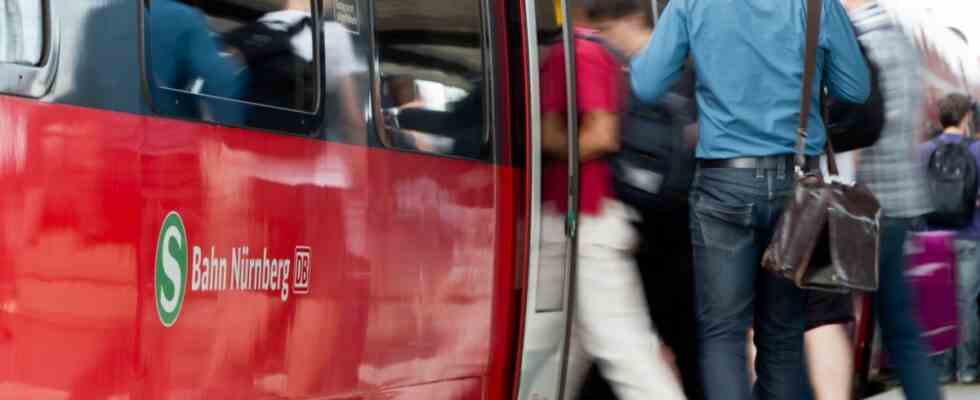This Friday, the Nuremberg city council is coming together for a “special session”, which sounds like an exceptional situation – and the date should actually set a milestone. What nobody can rule out at the moment, however, is that in retrospect, exactly this meeting will go down in the annals as a belly landing in a city of half a million. In essence, it is about the question of whether a city can ignore the will of its residents, which has been backed by a sufficient number of signatures, for a possibly groundbreaking referendum.
An initiative collected 18,000 signatures to ensure that the people of Nuremberg can decide whether a 365-euro ticket should be introduced. The special thing about it: It is not the first time that the said initiative has submitted a sufficient number of signatures for exactly this goal. That was the case two years ago and it led to a memorable event and noble words in the town hall.
On that June 17, 2020, the who’s who of the city gathered there, so to speak, to announce: There will be no referendum, because The city and the initiative agreed on a compromise agreed. Instead of 2021, as the initiative would have liked to see, the ticket will be introduced in 2023.
Politically, this appearance was the most important in the hitherto short term of office of the new Lord Mayor, Marcus König (CSU). The mayor spoke not only of a “milestone for Nuremberg”, but also that one would “write history” and be the “first big city in Germany” to commit to such a ticket.
The initiative saw a tendency towards “impudence”
But that didn’t come. Four months ago, the city council pulled the ripcord. In the past, the decision was made to buy a 365-euro ticket – even unanimously. Now, however, distance yourself from it. The reason? An expert report has shown that such a ticket entails additional annual costs of 23.6 million euros – but allegedly only an increase in demand of 3.6 percent. Also, there would currently be no funding for such a ticket. The government of Central Franconia had previously approved the Nuremberg budget, but under “strict conditions”. The planned 365-euro ticket was expressly pointed out. Before the historic ticket was introduced, it was already history.
The initiative, in turn, saw a clear tendency towards “impudence” in this decision. While the 2020 compromise that was celebrated at the time came about at the big table – with the participation of the mayor, council factions, initiative – the initiative suddenly no longer played a role in the moderation of the ticket. The initiators foamed; and collected signatures again. Successful, one believed.
So is the referendum coming after all? This is exactly what the upcoming special session should be about. The “facts” submitted leave little doubt that the city leaders want to prevent this. It is admitted that the initiative submitted a “sufficient number” of signatures to the electoral office. Nevertheless, the goals of the citizens’ initiative contradict “the principles of economy and economy”. Conclusion: “The required referendum will therefore not take place.”
Mayor Marcus König and the CSU parliamentary group refer to the municipal legal office as justification for their change of opinion. This was extensively examined, with the result that the citizens’ request was not permissible.
(Photo: Christine Dierenbach/City of Nuremberg)
The CSU, the strongest faction in the city council, has already positioned itself. The legal office has examined extensively and come to the conclusion that the citizens’ request is not admissible. “The CSU agrees with this position,” announced parliamentary group leader Andreas Krieglstein. The SPD, the town hall partner of the CSU, does not want to comment on this yet. According to SZ information, however, he should join the CSU. The “blue letter” from the government of Middle Franconia has changed everything, they say. The desired referendum would thus be rejected.
The initiative has already announced resistance to this. The fact that the city still classified the citizens’ request in 2020 as permissible, but the current one should suddenly be inadmissible, is “completely inconclusive,” says Titus Schüller, one of the spokesmen. The fact that the concerns of many thousands of citizens are dealt with in this way is significant, adds his colleague Özlem Demir. The initiators indicate that one knows how to defend oneself.
In fact, the lawyer Adelheid Rupp has already prepared a short report. In this, the lawyer came to the conclusion that the Nuremberg citizens’ petition was “without any doubt” permissible. In particular, the city “did not submit a legally sound template” but “essentially argued politically”. For this reason alone, the city’s arguments are not an obstacle, since the purpose of citizens’ petitions is “to get projects off the ground in the municipalities that either have not been taken up by the municipal parliaments or have not been taken into account”.
This is a party report, of course. However, just a few weeks ago, exactly this lawyer prevailed before the administrative court against another large Bavarian city, the city of Ingolstadt. This also wanted to prevent a referendum, which will now take place. Assuming that the Nuremberg City Council decides against a referendum on Friday, but this is fought for in court and ultimately ends up to the detriment of the city – this would possibly actually go down in the history of the city as a special case. But probably not as particularly happy.

